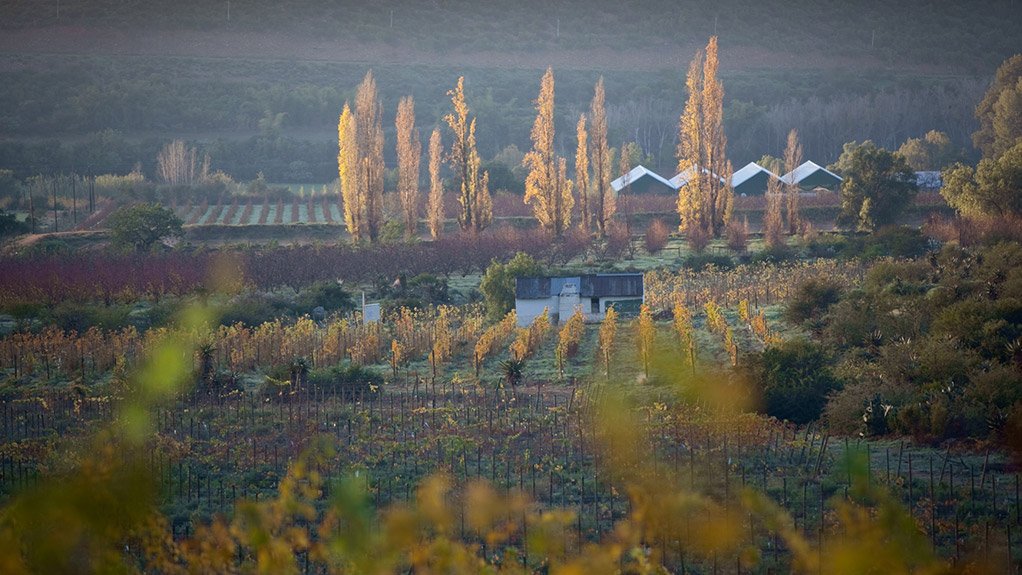Undertaking a comprehensive soil and climate research project before establishing a wine farm is necessary to limit risk when dealing with the unpredictability of nature, including climate change and soil condition, says Karusa Premium Wines & Craft Brewery winemaker and brew-master Jacques Conradie.
“Before we started operations in 2004, we had to know what we were up against. We took this data into account when considering certain practicalities, such as the choice of cultivars, trellising systems, irrigation methods, infrastructure planning, the ultimate goal of wine styles and fruit quality – this laid the foundation for everything we are doing now,” he explains.
Conradie adds that the task of undertaking a comprehensive research project was significant, as the premium wine, vineyard and export fruit business that Karusa subsequently established was a first for the immediate region, including the town of Oudtshoorn, in the Western Cape.
Conradie tells Engineering News that Karusa is a family-operated and -managed wine and fruit farm, where great concern and effort is placed on efficiency and productivity.
“Ours is a long-term goal of building a legacy, a brand and a sustainable future for our children and their children. The by-product is that the business covers our living expenses,” he says.
The significance of being “the first and only premium, privately owned winery in Oudtshoorn” is that not many wine investors think of investing in the wine business in this area, since it is not mainstream and “flashy” like other, more traditional and well-known wine areas such as Paarl, Stellenbosch and Worcester, also in the Western Cape.
Another significant factor is that competition is minimal in the area, as there are no other wine farms competing for business, which Conradie considers a benefit.
“Anyone that says competition is good has never been in the wine industry. It is a tough industry, where competition can kill your business. We capitalise on the large flow of visitors to Oudtshoorn, who also visit tourist attractions, such as the Cango Caves and ostrich farms.”
Conradie adds that visitors want to “eat and drink” the region, which is what the company specialises in – “putting the climate and other related enjoyables in a bottle for visitors”.
Wine Industry
Conradie notes that the South African wine industry is under huge pressure financially and socially as it is a regulated business subject to excise tax and liquor-sales legalities, as well as monitoring by wine industry bodies.
He says increased input costs, an unstable electricity supply and a weakening rand have also added to wine businesses’ “fight for survival”.
Conradie adds that investments from large corporates in wineries and farms that strive to achieve only profits for the investors inhibit the process of making great wine, as their primary goal is to mass-produce wine to generate sales.
This tends to make trading conditions difficult for family-run wine farms, where business is based on a “hand-to-mouth” system of survival, he says, adding that such wine farms always have to devise strategies to contend with wines sold by supermarkets. These bigger brands have significant budgets with sophisticated marketing programmes.
“However, at Karusa, our growth is based on customer loyalty from the quality of our products, the good service we provide for customers and our commitment to supporting smaller businesses in the area,” states Conradie.
Business Survival
Karusa has managed to survive and grow as a wine business as all the profits generated from the wine farm are reinvested into the business, says Conradie.
He adds that Karusa is constantly involved in “top-of-mind” marketing in Oudtshoorn and the surrounding region. Further, the wine farm has a good reputation among the locals because of the cleanliness and neatness of the facility, which does not degrade the surrounding environment. Further, the restaurant on the wine farm also offers high-quality food.
Karusa was voted Champion Winery for the Klein Karoo/Southern Cape for its wine, Stonerock Viognier 2014, at the 2015 Klein Karoo Bottled Wine Show, where only wines that were made from grapes harvested in the region were considered.
Conradie further emphasises the importance of having a good tasting facility, as it is a positive reflection of the business. “It is the first thing that people see when they walk into your facility and the old cliché of ‘first impressions last’, applies here.”
The tasting facility also needs to convey a subtle hint of what type of setup customers or visitors are entering, he concludes.
Edited by: Samantha Herbst
Creamer Media Deputy Editor
EMAIL THIS ARTICLE SAVE THIS ARTICLE
To subscribe email subscriptions@creamermedia.co.za or click here
To advertise email advertising@creamermedia.co.za or click here













